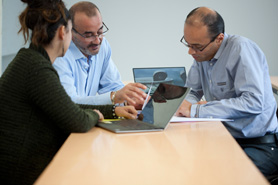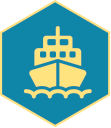
SEALiquid natural gas, a technical challenge for economic and ecological progress
In the face of the boom in sea transport and international requirements on the gradual replacement of heavy fuel, ARIAMIS proposes the alternative energy solution with liquid natural gas. The design department is working with shipping owners to anticipate, assess and organise the maritime energy transition.
ECOLOGICAL AND ECONOMIC STAKES
Sea traffic is growing significantly. This is the reason behind changes in sea fuel regulations. Indeed, appendix VI of the MARPOL convention (from MARine POLlution) covering atmospheric emissions in international waters, imposes sulphur contents of 3.5% globally and 1.5% in SECA zones, with major changes starting from 2015, especially for the SECA zones. The large majority of ships use heavy fuel considered to be highly polluting because of its sulphur content. A small number of ships use low sulphur content fuel, which is very expensive, or standard heavy fuel which is subjected to Scrubbing post-processing.
MUCH MORE NATURAL GAS RESERVES THAN CRUDE OIL RESERVES
Oil prices at the time of publication (April 2016) are very low. It is highly likely that price rises will follow, even very steep price rises! In addition to a more affordable price, there are also much greater reserves of natural gas than of crude oil. Natural gas therefore seems to be an energy solution that is as economic as it is ecological. However, natural gas has a major problem: in order to remain in a liquid state, it must be kept at -163°C. This is a spectacular number, but the technology is well-known and mastered. Natural gas tankers have been using their cargo’s boil-off effect as fuel for many years.
ANTICIPATING AND SUPPORTING A FUEL CHANGE IN SEA TRANSPORT
Thermal management is at the heart of liquid natural gas issues. Even if the natural gas tanker technology is mastered, we must admit that they have tank of about 150,000 m3 which is their cargo! The stake is therefore to successfully use natural gas in 3,000 to 4,000 m3 tanks. Through its experience and expertise, ARIAMIS proposes the design tool called: SUCGESS (SUpport in the Choice of the Global Energy System of a Ship). > Running on natural gas stored in membrane tanks > Storage and management of LNG fuel > Propulsion device > Electric plant > Machine auxiliaries created so that there is no loss of commercial capacity for the ship compared to the conventional UCLV powered by a 2-stroke engine and fitted with 4-stroke GE. The stake is in how to intelligently manage the gas boil-off...
|
KEY NUMBERS
Over ten years of experience and a significant number of studies and projects ENVIRONMENTAL
In combustion engines, the creation of heat naturally has less environmental impact than the creation of cold ROAD
Over 10 years of thermal expertise to develop vehicles driving all over the world |















